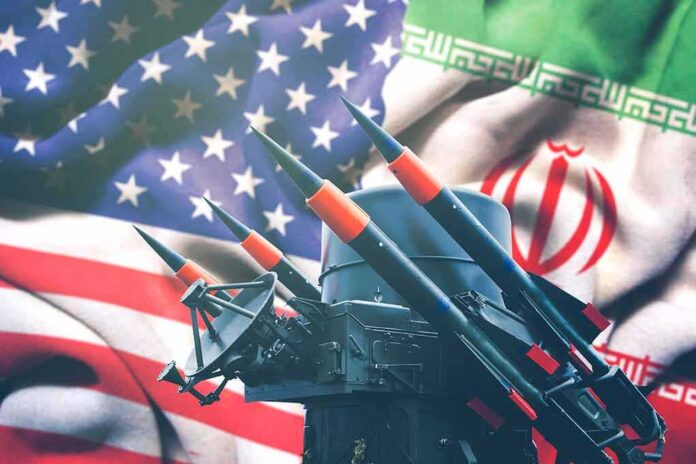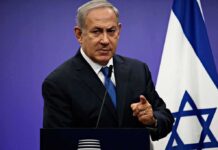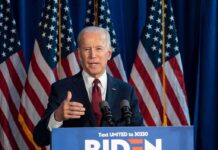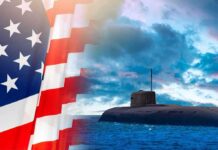
President Trump tightens the noose on Iran’s illicit oil trade while offering a diplomatic path to nuclear de-escalation, presenting Tehran with a stark choice: abandon uranium enrichment or face increasingly crippling economic isolation.
Key Takeaways
- The Trump administration has imposed new sanctions targeting a network of corporations facilitating Iran’s covert oil sales, primarily to China
- President Trump is leveraging maximum pressure while simultaneously pursuing nuclear negotiations, demanding Iran permanently cease uranium enrichment
- Iranian officials have expressed willingness to make nuclear concessions but consider some level of uranium enrichment non-negotiable
- Trump has enlisted Qatar’s help in mediating talks and warned Iran “something’s going to happen one way or the other” if they fail to make “the right decision”
- Iran currently enriches uranium to 60% purity (near weapons-grade) despite previous agreements limiting enrichment
Trump’s Dual-Track Approach: Sanctions and Diplomacy
The U.S. Treasury Department has announced a significant expansion of sanctions against Iran, targeting nearly two dozen firms involved in disguising and facilitating the country’s international oil trade. The measures specifically target Sepehr Energy and its network of front companies that allegedly engage in oil smuggling and money laundering operations. These sanctioned entities are accused of using deceptive practices to obscure the origin of Iranian oil shipments, allowing the regime to bypass international restrictions and continue selling petroleum products, primarily to China.
“Today’s action underscores our continued focus on intensifying pressure on every aspect of Iran’s oil trade, which the regime uses to fund its dangerous and destabilizing activities,” stated Secretary of the Treasury Scott Bessent. The Treasury Department maintains that revenue from these oil sales directly finances Iran’s ballistic missile program, nuclear activities, and support for terrorist proxies throughout the Middle East. The sanctions represent the latest move in President Trump’s maximum pressure campaign aimed at forcing Tehran to permanently abandon its nuclear ambitions.
Nuclear Negotiations at Critical Juncture
Parallel to the sanctions, the Trump administration is engaged in indirect talks with Iran, mediated by Oman. These negotiations have reached a critical impasse over uranium enrichment. The U.S. position demands verifiable proof that Iran has halted all uranium enrichment activities before sanctions can be lifted. Special Envoy to the Middle East Steve Witkoff stated the administration’s position clearly: “An enrichment program can never exist in the state of Iran ever again. That’s our red line.”
“I hope you can help me with the Iran situation. It’s a perilous situation, and we want to do the right thing,” Trump told Qatari officials during his Middle East tour, seeking additional diplomatic channels to influence Tehran.
Iranian officials, by contrast, maintain that some level of uranium enrichment is non-negotiable, though they have signaled openness to temporary limitations similar to those in the Joint Comprehensive Plan of Action (JCPOA), which President Trump withdrew from during his first term. Ali Shamkhani, an adviser to Iran’s Supreme Leader, has indicated Iran is prepared to make concessions, including allowing international inspectors to supervise its nuclear activities and pledging to never manufacture nuclear weapons.
Iran’s Current Nuclear Status and Trump’s Warning
Despite previous agreements to limit enrichment, Iran has accelerated its nuclear program since the U.S. withdrawal from the JCPOA. The regime currently enriches uranium up to 60% purity, dangerously close to the 90% threshold required for weapons-grade material. This advancement poses a severe security threat to the United States and our allies in the region, particularly Israel, which has been targeted by Iran’s proxies, including Hamas, Hezbollah, and the Houthis.
“Iran must stop sponsoring terror, halt its bloody proxy wars, and permanently and verifiably cease pursuit of nuclear weapons,” President Trump declared during his Middle East tour, making it clear that any agreement must address Iran’s full spectrum of destabilizing activities.
The president has issued a direct warning to Tehran to make “the right decision” regarding its nuclear program, adding ominously that “something’s going to happen one way or the other.” This statement underscores the Trump administration’s determination to prevent Iran from obtaining nuclear weapons capability by any means necessary. Despite the tough talk, Secretary of Energy Chris Wright has expressed optimism that a deal could be reached by year’s end, describing it as potentially “a win-win situation.”
Economic Pressure on Iran’s Oil Sector
The Treasury Department’s latest sanctions target what officials call a “shadow fleet” of vessels used to transport Iranian oil clandestinely. This network reportedly employs sophisticated deception tactics, including ship-to-ship transfers and falsified documentation, to disguise the origin of oil shipments. By cutting off this revenue stream, the Trump administration aims to deprive the Iranian regime of the financial resources it uses to fund its nuclear program and support terrorism throughout the Middle East.
“As long as Iran devotes its illicit revenues to funding attacks on the United States and our allies, supporting terrorism around the world, and pursuing other destabilizing actions, we will continue to use all the tools at our disposal to hold the regime accountable,” stated State Department spokeswoman Tammy Bruce, emphasizing the administration’s commitment to using economic pressure as leverage in diplomatic negotiations.
The dual-track approach of aggressive sanctions combined with diplomatic outreach reflects President Trump’s strategy of creating overwhelming pressure to force meaningful concessions from the Iranian regime. Unlike the flawed JCPOA, which merely delayed Iran’s nuclear ambitions temporarily, the Trump administration is pursuing a comprehensive agreement that would permanently eliminate Iran’s capacity to develop nuclear weapons while also addressing its support for terrorist proxies and destabilizing regional activities.

































